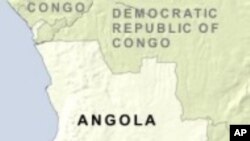The International Organization for Migration warns of an increase in human trafficking for sexual and labor exploitation in Angola in the build-up to the African Cup of Nations football tournament in early 2010. The organization has begun a two-day meeting in Luanda to explore ways of preventing an escalation in human trafficking.
2010 is a big year for major sporting events in Southern Africa. The African Cup of Nations takes place in Angola in January, while South Africa will host the football World Cup in June and July.
Southern Africa is normally a region of intense migration flows and trafficking. International Organization for Migration spokesman Jean-Philippe Chauzy tells VOA he fears these sporting events could trigger a significant rise in human trafficking.
"We are concerned with lots of football fans expected to converge on Angola ahead of the tournament and increase migration flows to the country, there might be some instances by which human trafficking might occur," said Chauzy. "Either human trafficking for labor exploitation or for sexual exploitation."
IOM notes there is growing concern among women's rights groups in the country that the inevitable influx of tourists will set a fertile ground for sex work that could be exploited by human traffickers.
Chauzy says it is for all these reasons that IOM is working with civil society groups, the government and organizers of the Cup of Nations to make sure the public is aware of the issue of trafficking, so it does not get out of hand.
"We are planning to put together an information campaign in the coming weeks that would basically contribute to raising awareness on Human Trafficking of adults, but also minors during the African Cup of Nations," he added. "Obviously, this information campaign would be one of the ways we would reach out to the general public. But, we would also rely very heavily on the network of NGO's that already are working on those trafficking issues in Angola, in South Africa and within the southern African region."
The 2009 U.S. State Department's report on Trafficking finds Angola is primarily a source country for trafficking. It says women and children are mainly trafficked within the country for domestic servitude and young men for forced agricultural labor.
But the report notes Angolan women and children also are trafficked to South Africa, the Democratic Republic of Congo, Namibia and Portugal for labor and sexual exploitation.




